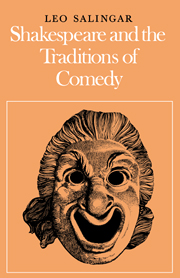5 - Shakespeare and Italian comedy
Published online by Cambridge University Press: 04 December 2009
Summary
It's true that neither vulgar prose nor rhyme
Can be compared with ancient prose or verse,
And eloquence has fallen from its prime;
But seeing wits are not indeed diverse
From those the heavenly Artist used of old,
What's done by them today need not be worse.
AriostoI travail with another objection, signior, which I fear will be enforced against the author…That the argument of his comedy might have been of some other nature, as of a duke to be in love with a countess, and that countess to be in love with the duke's son, and the son to love the lady's waiting-maid; some such cross wooing, with a clown to their servingman, better than to be thus near, and familiarly allied to the time.
JonsonAthenian Old Comedy had been a political celebration, Roman comedy a festive entertainment. The achievement of the Italians in the early sixteenth century was to reintroduce the methods as well as the spirit of Roman comedy to modern Europe, though in reviving them they inevitably changed them, making of comedy more of an intellectual game and setting the dramatist to range as best he could between open-minded observation and technical virtuosity. But by modifying as well as retrieving an art-form from the past, Ariosto's generation prepared the way for both Molière and Shakespeare.
The renaissance of New Comedy in Italy spread across a century. It was heralded by the recovery of twelve new texts of Plautus in 1429 and of Donatus's commentary on Terence in 1433 – so that scholars could now read nearly twice as many Roman comedies as before and had a better means of appreciating their structure.
- Type
- Chapter
- Information
- Shakespeare and the Traditions of Comedy , pp. 175 - 242Publisher: Cambridge University PressPrint publication year: 1974



